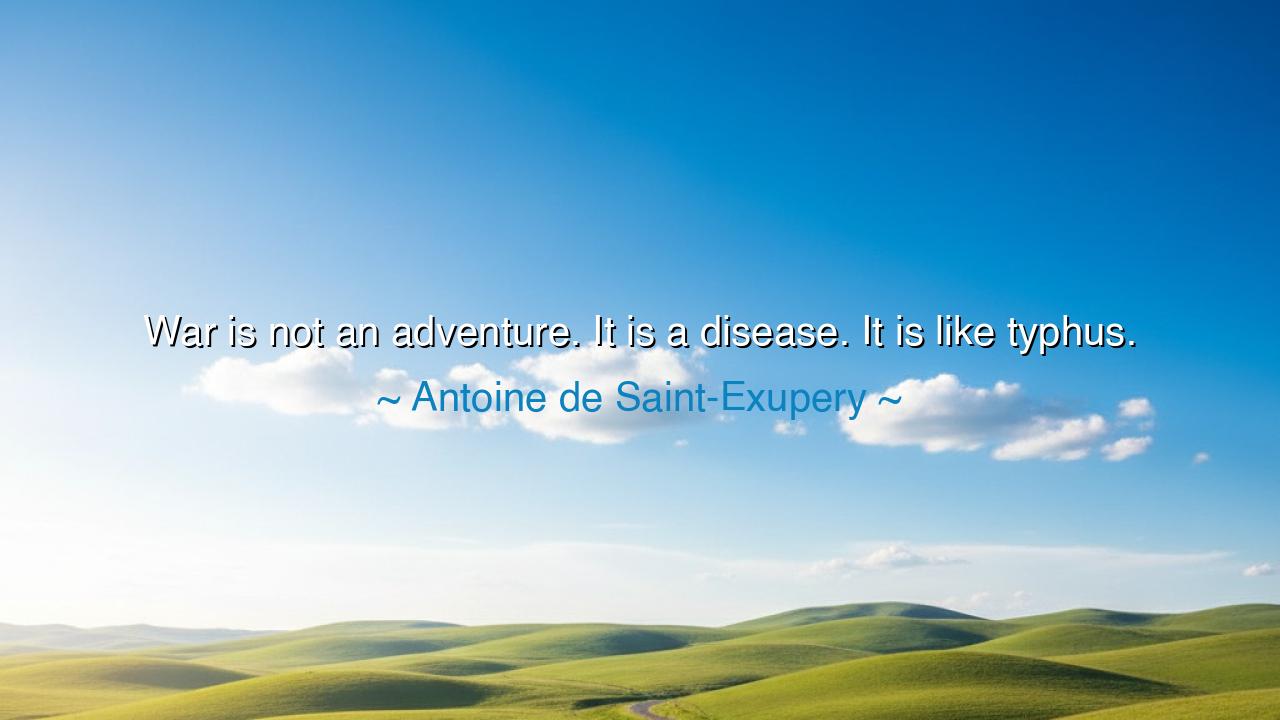
War is not an adventure. It is a disease. It is like typhus.






Hear, O children of tomorrow, the mournful cry of Antoine de Saint-Exupéry, the aviator and poet who soared above the earth and saw its sorrows from the skies. He spoke thus: “War is not an adventure. It is a disease. It is like typhus.” In these words he strips away the false cloak of glory and reveals the naked truth: war is not the noble quest sung by storytellers, nor the thrill of heroes in search of destiny. War is a sickness that spreads from man to man, nation to nation, devouring the strong and the weak alike, leaving behind fever, ruin, and death.
The origin of this saying lies in the crucible of the Second World War. Saint-Exupéry, a pilot in the French Air Force, flew missions over a continent torn apart. He witnessed the suffering of civilians, the collapse of cities, and the endless procession of the displaced. To him, war was no adventure—it was contagion, spreading like typhus, the disease that ravages not only bodies but also dignity and hope. He saw with piercing eyes that those who call war “adventure” are like children playing with fire, blind to the inferno they unleash.
History testifies to his wisdom. In 1918, the world rejoiced at the end of the First World War, believing the adventure had been worth the sacrifice. Yet the survivors carried within them a plague of despair: the trenches filled with gas, the mutilated bodies, the unending grief of families who never healed. The disease of war lingered long after the cannons fell silent, festering in bitterness and poverty, and soon gave birth to another, greater conflict. Thus war proves itself a pestilence: it does not end with the signing of treaties, but seeps into the generations that follow.
Think, too, of the Siege of Leningrad in the Second World War. For nearly nine hundred days, hunger and cold gnawed at the people as shells rained down. Was this adventure? No—it was a plague of suffering. The old, the young, the helpless, all endured famine, disease, and terror. Yet their endurance itself bore witness to the truth of Saint-Exupéry’s words: war is a disease, and those caught in its grip resemble not warriors in triumph, but patients in agony.
The ancients also understood. Did not Thucydides write of the plague of Athens during the Peloponnesian War, when pestilence swept through the city as enemy armies pressed its walls? In his tale we see the marriage of war and disease: the sword strikes from without, the fever consumes from within. Thus Saint-Exupéry’s metaphor is not mere poetry—it is the lived truth of centuries, that war spreads like infection, and no man, woman, or child escapes untouched.
What then is the lesson we must take? That we must strip away the illusions that cloak war in glory. Do not believe those who promise adventure in the clash of arms, for they offer only the contagion of misery. Know that to wage war is to release a pestilence into the world, and once unleashed, it consumes all with equal cruelty. If we call it adventure, we make it tempting; if we name it disease, we remember to flee from it as from plague.
Practical action lies before us: cultivate peace as one cultivates health. Strengthen the bonds of fellowship between peoples, so that the disease cannot spread. Confront those who glorify violence, and remind them that the scars of war last far longer than the thrill of battle. Teach the young that war is not an adventure but a sickness, and that the true hero is not the one who spreads it, but the one who heals its wounds.
So let these words echo across the ages: “War is not an adventure. It is a disease. It is like typhus.” Carry them as both shield and medicine, that you may resist the fevered cries of war when they rise again. For if we heed this wisdom, we may pass to our children not the plague of conflict, but the blessing of peace, whole and enduring.






MDManh Duy
Saint-Exupéry’s metaphor of war as a disease offers a powerful lens through which to view conflict. It suggests that war’s effects are widespread and infectious, damaging the fabric of society in ways that can’t easily be undone. If war is like typhus, can we ever fully heal from its impact, or is the damage permanent? How can we break this cycle of destruction, and can humanity truly evolve beyond war?
ATNguyen Vo Anh Tuan
This quote really makes me reconsider how we romanticize war in stories, movies, and history. Saint-Exupéry’s perspective reminds us that war is not glamorous or noble; it’s a destructive force, much like a deadly disease. Can we as a society truly understand the horrors of war if we continue to glorify it? How can we shift the narrative and educate future generations about the true cost of conflict?
HLNguyen le ha linh
I find Saint-Exupéry’s comparison of war to a disease both powerful and unsettling. A disease is something that destroys without reason or logic, and war often has similar qualities. It makes me ask: How can we continue to view war as a necessary evil or an adventure when it’s ultimately just a destructive force, claiming countless lives in the process? How do we prevent war from becoming a recurring sickness in society?
GDGold D.dragon
Saint-Exupéry’s quote is a profound reflection on the true nature of war. By comparing it to a disease like typhus, he emphasizes how war spreads uncontrollably, infecting everything it touches. This metaphor makes me think about how, once war takes hold, it affects not only the soldiers but entire societies. If war is truly like a disease, how can we stop its spread, or is it an inevitable part of human nature?